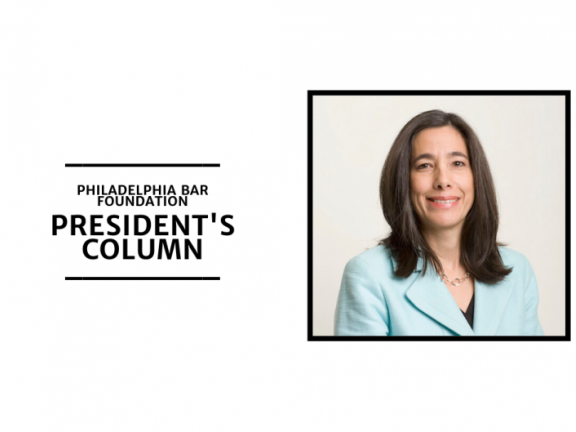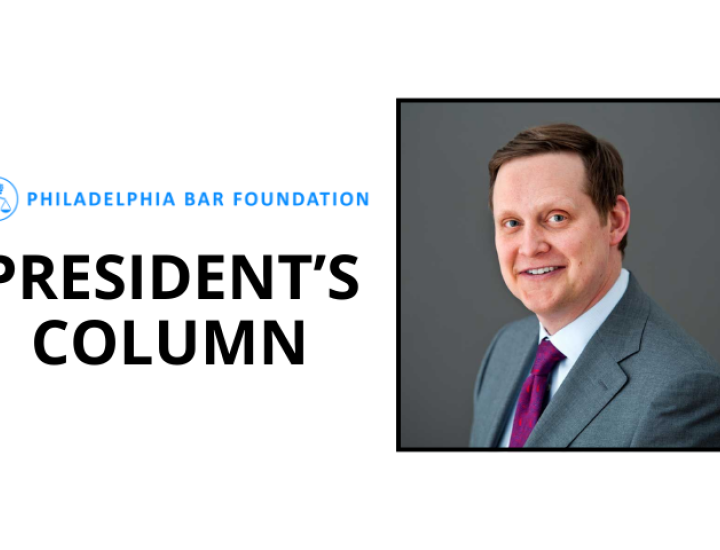Future Initiatives at the Bar Foundation

By Leslie E. John, Partner at Ballard Spahr and President of the Philadelphia Bar Foundation.
As we approach the end of the year and the season of giving thanks, it feels incumbent upon us to reflect on the past year. When the Equal Justice Center (EJC) project leadership gathered on March 2nd at the Ritz Carlton to champion the project’s progress, we had no idea we were on the cusp of a global health crisis that would cost so many lives and bring economic instability to so many. Nor did we know that a racial justice reckoning was upon us that would compel all of us to embrace the moral imperative to dismantle structural and systemic racism. In response to these imperatives, the Bar Foundation is engaged in an in-depth and purposeful examination of how best to fulfill its mission.
Leadership at the Bar Foundation has asked ourselves, our stakeholders, and our nonprofit partners many important questions during this time. What are the most critical and effective actions we can take to support the work of the public interest law firms in Philadelphia? How can we collectively tackle reforming the civil legal system to dismantle white supremacist inequities, and enhance and increase quality legal services? Where can we best support all members of our community, especially those who are most disadvantaged by the status quo?
In approaching these questions, we are grounded in the understanding that equal access to justice is both a basic human right in itself and the means by which other basic human rights are protected and secured, procedurally and substantively. Indeed, this year we have been reminded that equal justice under law is critical to the very stability of our society. In its absence, when individuals cannot rely on a justice system to protect their most basic rights, those individuals and their communities lose faith in our public institutions. More than 80% of Philadelphians before our civil courts are without legal representation in proceedings that threaten their fundamental human rights, including rights affecting their health, employment, housing, families, and personal safety. By any measure, this surely means that we have work to do to ensure our justice system is itself just.
You may already know that we concluded that this year was not the time to construct an Equal Justice Center building. Economic constraints imposed by the COVID-19 pandemic and the common uncertainty about the future of physical workspaces, particularly the safety of co-location and the size and utilization of the offices of tomorrow, were significant factors in this decision. The Bar Foundation has pivoted to pursue the programmatic elements of the EJC project that can be implemented even in the absence of co-location. We are embarking on developing technologies, community-based programs, and systems that will increase capacity for the delivery of services and make it easier for Philadelphians to get the legal help they deserve.
Here are three initiatives we are focusing on now:
- Conducting a readiness assessment and technology review with the goal of developing a centralized intake system pilot program. This process will look at data standardization and provide insight into how agencies can more effectively share information about legal aid access and resources; increase the delivery of civil legal aid services; and enhance collaboration among legal aid agencies, their community partners, other potential partnerships (e.g., libraries), and the courts.
- Exploring the development and deployment of community legal navigators to identify emergent community needs and refer individuals to available legal aid and social service resources.
- Piloting a Legal Incubator project that will train and employ new Philadelphia lawyers (with an emphasis on recruiting diverse lawyers and those who have lived experience and language skills) to provide low-cost legal services to minority-owned, micro-businesses in Philadelphia.
Consistent with our mission and strategic plan, we are continuing to foster new partnerships and alliances with communities, libraries, educational institutions, and government to develop more holistic solutions to legal problems confronting our community members, and to enhance collaboration among our nonprofit partners, allowing them to overcome challenges in the legal aid sector and better respond to emergent needs in communities.
As a legal community, we must do more, and we must do better. We can no longer accept that well-intentioned efforts to ‘do more with less’ are adequate. Legal aid agencies, who were overworked and overwhelmed before the pandemic, now face a surge in need for their services and a decrease in funding. We must work together to challenge unfair norms and reform the civil legal system to overcome systemic racism.
As we strive to find new, innovative solutions, we appreciate your continued support of our work. I welcome your engagement as we work on these exciting initiatives at the Bar Foundation.
